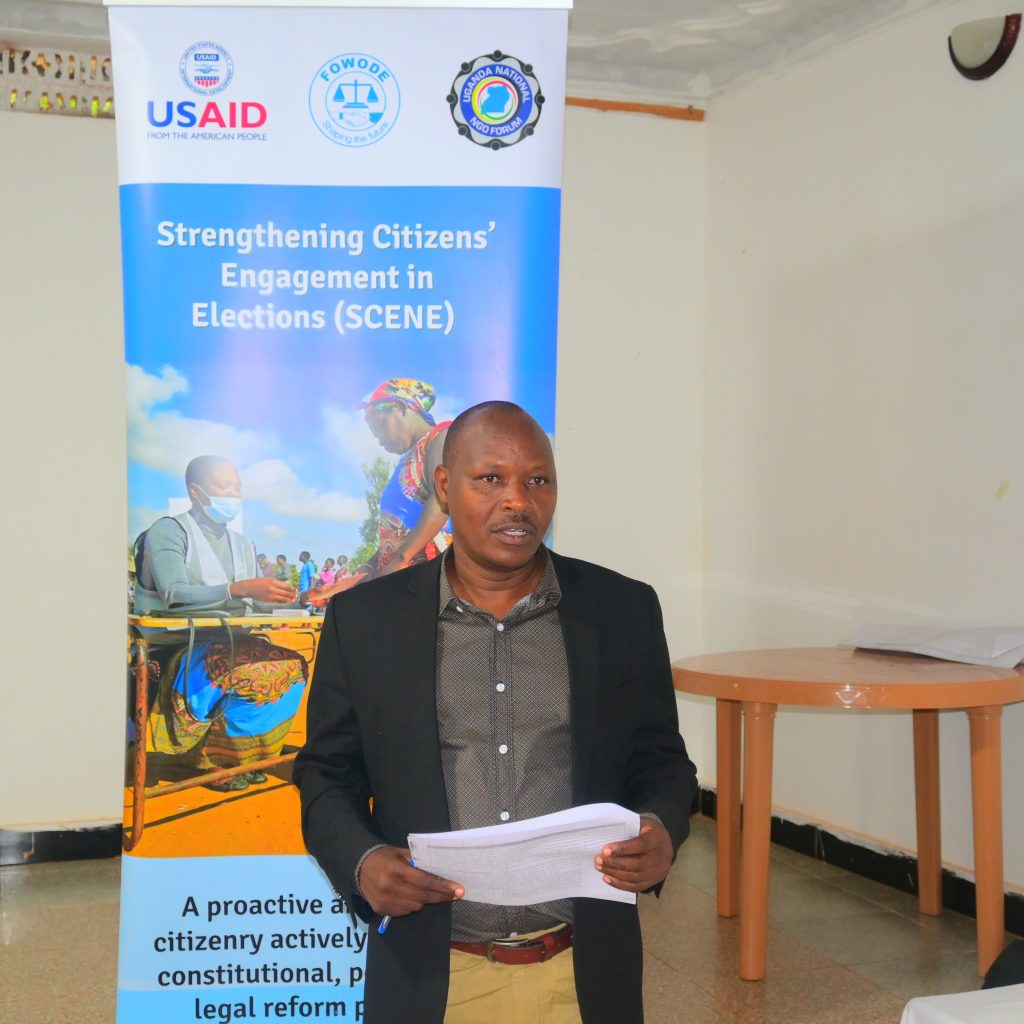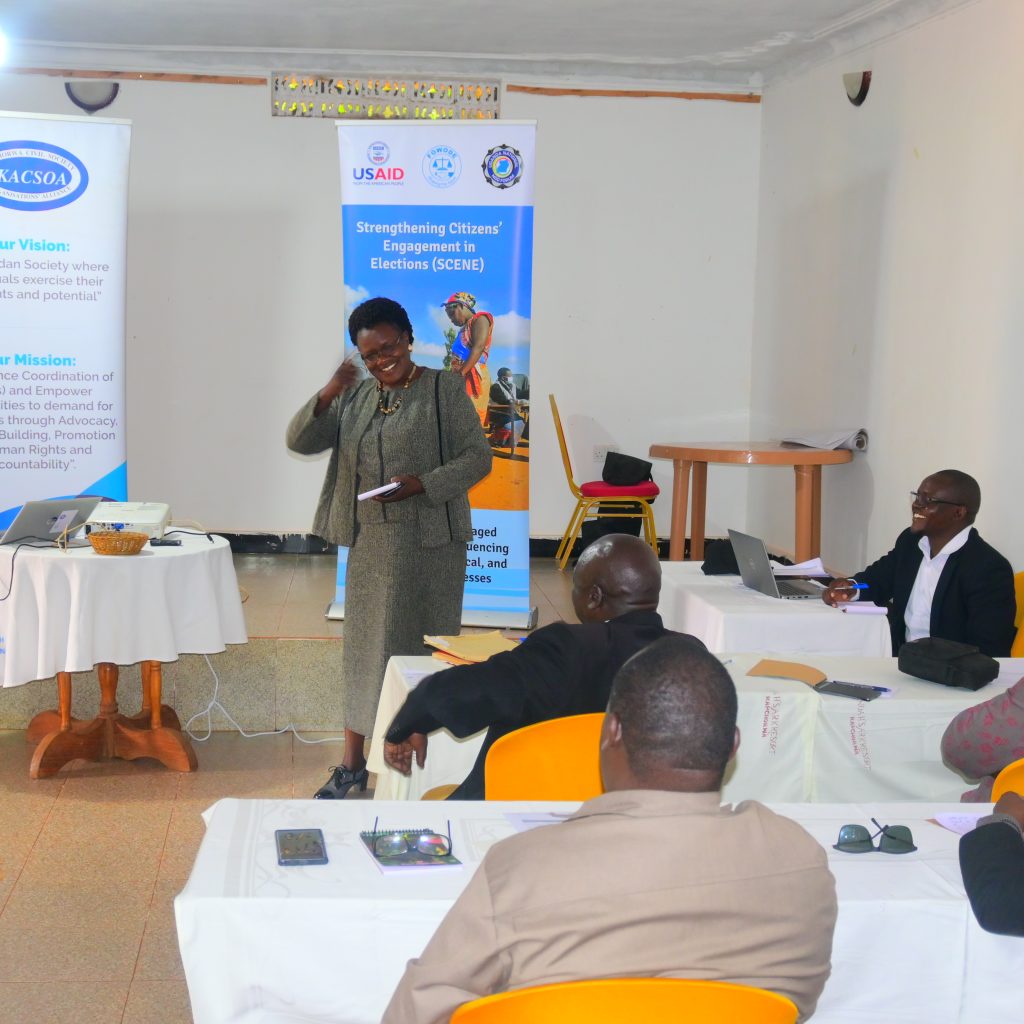Over the last few month while implementing the Strengthening Citizens’ Engagement in Elections (SCENE) Project ,we’ve reached out to different communities accross the region to collect their views on Constitutional reforms though ‘Ekyoto’ (Fireplace conversations) and ‘Topowa’ Forums on Constitutional,Political and Electoral reforms.
KACSOA today presented the reforms to the Honourable members of parliament representing Sebei sub-region that included;Hon. Chemuati Phyllis (Woman MP,Kapchorwa),Hon. Alinga Solomon Chelangat(M.P,T’oo County),Hon. Kisos Abdi Fadil Chemaswet (M.P,Soi Constituency) and Hon. William Chemonges (M.P,Kween County).
The purpose of this engagement was to create a platform for these representatives to freely express their valuable views, concerns, and insights on the proposed reforms.By involving them in this process, we hoped to foster a stronger bond between the lawmakers and the proposed reforms, encouraging their sincere commitment and dedication towards its success.
Some of the Proporsed Reforms
Political Term Limits, Electoral Commission Independence, Minimum Education Qualifications, Joint Political Rallies during Campaigns,Remuneration for Councilors,Running Mates for LCV Chairperson.

Honorable Kisos Chemaswet, who serves as the Member of Parliament for Soy County, has put forward a significant proposal. He suggests the establishment of regional governments along with their respective regional parliaments. The aim of this proposal is to create a larger resource pool that can be allocated at the regional level. By doing so, it is believed that this approach could help alleviate tension and conflicts at the national level.
“The reforms have come at the right time,Our Constitution is not cast on stone and is bound to change and as citizens of Uganda,we have the right to shape it for the good of our People”-Hon. Alinga Solomon Chelangat,M.P T’oo County.

Hon. Alinga expressed his disagreement with the proposal of aspiring members of parliament participating in joint political rallies. He voiced concerns that such joint rallies could potentially lead to chaos and disorder.
His apprehension likely stems from the fact that when multiple candidates or parties gather at the same event, there is an increased risk of heated confrontations, conflicting ideologies, and even violence among their supporters. Joint rallies might become contentious battlegrounds where opposing political factions clash, undermining the peaceful and orderly conduct of political campaigns.
Hon. Phyllis Chemutai, the Member of Parliament representing Kapchorwa women, commended the efforts of the Civil Society organization KACSOA. She encouraged them to persist in their mission of educating the community about their roles and responsibilities as citizens. This, she believes, will have a significant positive impact on the relationship between leaders and their constituents.

Additionally, Hon. Phyllis Chemutai took action by validating a number of proposed reforms, showing her support for measures aimed at improving governance and the political landscape. Her actions and words reflect a commitment to strengthening the connection and understanding between leaders and the people they represent, ultimately fostering better governance and civic engagement.

Hon. William Chemonges urged fellow honorable members to actively support and engage in the proposed reforms. He also emphasized the importance of adequately facilitating the Chairperson of the Local Council (LCV) and honorable councilors. His reasoning behind this recommendation is rooted in the belief that these local government officials play a crucial role in overseeing local budgets.
By providing adequate resources and support to the LCV chairperson and councilors, it becomes easier for them to effectively monitor and manage the local government budget. This oversight is essential because it serves as a check and balance within the system, helping to ensure that public funds are used transparently and efficiently for the benefit of the community.
The dialogue concluded with a commitment from the honorable members to lend their support to the proposed reforms, all in the interest of improving the lives of the citizens. This means that the participants, including the members of parliament, expressed their willingness and dedication to back these reform initiatives.
Their pledge signifies a collective agreement to work towards implementing the suggested changes in laws, policies, or governance structures, recognizing that these reforms are aimed at benefiting and serving the best interests of the people they represent. In essence, the dialogue concluded on a positive note, with the understanding that the lawmakers would take concrete actions to bring about positive changes and improvements in various aspects of governance, law, or policy for the well-being of the citizenry.


Add a Comment